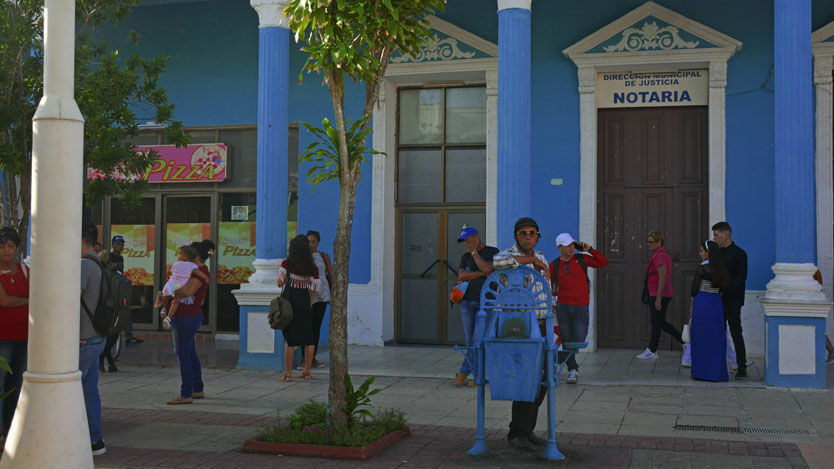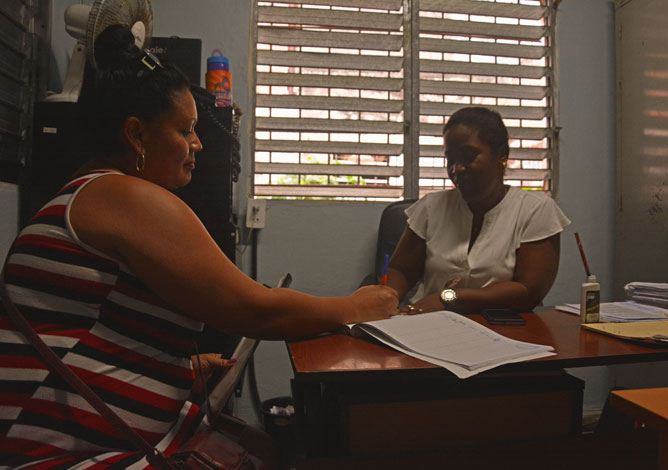
On a Friday morning, the telephone number of the Ciego de Ávila notary's office could collapse very easily before the appointments for the next week run out. There will be those who call again and again, until they arrange a day and time for their procedure, or who try with the same insistence to, in the end, hear that the shifts are exhausted, with no other choice but to resign themselves to waiting until next Friday.
Nevertheless, before arriving there, the crowds in the middle of the boulevard and everything that this implies (queues at dawn, resale of shifts, disorganization) were the obstacles to overcome to access a notary. A "chaos" that came from the growth in the demand for notarial procedures —especially in the notarial unit of the main municipality, the largest in the province and, therefore, the one with the largest settlement— and to which, as Yordan Carbonell Montiel, head of the Department of Notaries and Civil Registry in the Provincial Directorate of Justice, explains, they tried to put a stop to it with the implementation of the telephone appointment system. Whether or not they succeeded remains to be seen.
That it is a measure to win in organization, Marta Carralero Ordóñez can well understand, although in her opinion “it is not the best option”. And she says it with all the property of the one who, to make a housing donation for his granddaughter, called non-stop on a Friday from 7:59 to 9:34 a.m. and, when they answered him, there were no shifts available. If she was able to advance, without having to wait another week, it was thanks to her neighbor who, for helping her, tried at the same time and managed to “classify”.
Like yours, other stories, more or less happy, can be heard among those waiting outside the entity. The panorama already seems complex from there, but it worsens much more, behind closed doors, if, as revealed by the head of the Department of Notaries and Civil Registry, of 29 notaries in the province, only five work in it.
However, the lack of notaries is just the tip of the iceberg, since to this Carbonell Montiel adds the time required for notarial activity, dictated by the inviolable principles that govern it, which is in correspondence with the complexities of the type of processing to be carried out. “The notary is not a simple processor. He must write his document, read, advise and try by all means that the person who is before him leaves with a basic knowledge of the procedure he is doing.

A time to which breaks have been imposed, almost mandatory, by the effects on the electricity supply in recent months, even though “the priority has been to advance as much as possible while there is electricity”, without this being able to completely unlock the “bottleneck ” Well, unlike other places, “the speed of a notary service may generate processing, but not quality.” What satisfaction could we talk about if mistakes and lack of direction forced us to return.
Taydi Almeteros Quiñónez, chief notary and provincial deputy director of Justice, gave the adjective to the criticality of the situation when she declared to Radio Surco that "we have practically categorized the notarial service as collapsed."
In addition, Yordan Carbonell gives context to the adjective when speaking of a process that has been on the rise since 2011, with the entry into force of the law that approved the sale and donation of homes, and to which the increase in the legal culture of a society gave more weight that does not escape the migratory flow, the closure of offices forced by Covid-19 with its consequent delays for the procedures already started, the constitution of medium and small companies, until the recent approval of the Family Code, with all its modifications , which set a self-improvement challenge for jurists.
As a result, Carbonell Montiel points out, an average of 50-60 documents are authorized daily in the notaries of the province, when five years ago they averaged 30. A quantitative leap that crosses provincial borders. During 2019 —according to the Minister of Justice, Oscar Silvera Martínez, who inaugurated the Teaching Notarial Unit of the University of Ciego de Ávila Máximo Gómez Báez last July— around 685,000 notaries around the country issued documents, a forecast that for this year is close to 900,000.
Moreover, as someone who does not intend to justify, Yordan Carbonell acknowledges that, along with the objective problems, there are also indiscipline, lack of sensitivity, mistreatment, rallying. That cancer is still around." Situations that, although they are not usual, should not exist; which is why, he specifies, when they are detected and proven, they end with the expulsion of the person involved.
The notarial equation, whose result should always be a better service, today is having a hard time clearing up its variables. The more demand, the more notaries, many place the expeditious solution there, but the head of the Department of Notaries and Civil Registry knows that it is not that easy, because "a notary is trained over the years and not all jurists want to be."
However, the aforementioned notarial teaching unit, which has also been a kind of "relief" by bringing services closer to the university community, could greatly influence this training. For now, encouraging the qualification process of these legal professionals is a priority and hopes are pinned on the coming December, when the next qualification exam carried out by the Ministry of Justice is scheduled to take place.
